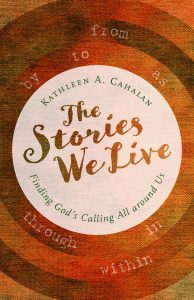 The Stories We Live: Finding God’s Calling All around Us
The Stories We Live: Finding God’s Calling All around Us
by Kathleen A. Cahalan
Wm. B. Eerdmans Publishing Co, April 2017, 150 pp.
This article is an adaptation of the introduction from The Stories We Live: Finding God’s Calling All around Us, which will be released on April 6, 2017. This book is one of several that has emerged from the Collegeville Institute Seminars.
“I don’t know that I’ve ever been given a calling.”
When I asked Jay about his life’s journey, he described the joy of family life, his skills as a financial analyst, and the meaning he gets from helping others with difficult decisions. He found God in others; in leadership and coaching, and especially in his role as father and husband. Jay was grateful for his life, and he wanted to give back to the community. I asked him, “Do you have a sense that God has called you to be a father, coach, banker, and community member?” “Well,” he said. “I don’t know that I’ve ever been given a calling.”
I’ve heard Jay’s story many times from people in churches, students in classrooms, friends, and even strangers. God’s callings are all around us, but we don’t always see them. Jay’s life is an example of what Christians have traditionally called “vocation.” (The word “vocation” has the same meaning as “calling”; it comes from the Latin vocare, which means “to call.”) He strives to follow the gospel; he engages in meaningful work that is a service to others; he has a sense of his capacities and gifts; he is committed to his family as parent and spouse; and he wants to give his life for the sake of his neighbors and community. Listening to his story, I wanted to cry out, “Jay, you’ve been given many callings!” But he wasn’t able to see this yet.
What would change and deepen for Jay if he started to see his life’s relationships and work as callings from God? How might your life change if you started to see this too? It matters if the story we tell about our lives is rooted in God’s callings. But how do we tell our stories? What language can we use to capture the callings that make up our lives?
Prep-o-si-tion. noun, grammar: A class of words found in many languages that express relationship.
Here’s one way people commonly talk about their callings. They use a noun: “I’m trying to figure out what my vocation is” or “I’m searching for the meaning of my life.” The danger is that when you speak of vocation as a noun, it can sound as if it is something already constructed. God will hand it to you ready-made. But life is rarely that neat and tidy. Speaking of your callings with nouns ends up sounding static, passive, and singular.
There’s another, more active way to frame your calling: as a verb. For instance, in my life, God has been known to call out to me, sometimes in a whisper, but mostly by a shout, a nag, or a push. I’ve been known to holler back. Verbs are dynamic; they create action and movement in a story. When we describe the action of our lives, we can begin to see that callings are a response to God and others.
But another kind of word explores vocation even better: prepositions. They are parts of speech that connect words to other words: to the store, with Ed, away from barking dogs, for milk. Prepositions express relationship. When we frame vocation through prepositions, callings become more relational, dynamic, and multiple. Prepositions express the whole of our lives, even the places and experiences we never thought of as callings.
I am called
by God,
to follow,
as I am,
from grief,
for service,
in suffering,
through others,
within God.
Each of these prepositions reveals a different dimension of our callings. We are called by God, who is the source of our callings. We are called to follow the way shown by Jesus and taken up by his disciples; this calling we share with each other. We are called as unique persons with a particular history and circumstance. We are called from the losses and grief we suffer over time, so that we can embrace life again. We are called to give our lives for others, not simply for our self-improvement or fulfillment. We are even called in our deepest suffering to carry out God’s purposes in mysterious ways. We are called through the people in our lives, because vocation takes root in community. And, finally, we are called together to live within God’s loving embrace, both now and in the life to come.
 Prepositions, the smallest words in our vocabulary, carry the meaning of our callings in the stories we tell. By shifting the grammar of vocation, prepositions will help us see God at work in our own life, where God is inviting us to find our story within the divine story.
Prepositions, the smallest words in our vocabulary, carry the meaning of our callings in the stories we tell. By shifting the grammar of vocation, prepositions will help us see God at work in our own life, where God is inviting us to find our story within the divine story.
What is your story? How have you experienced being called by God? If you have, what difference has it made for you and others? If you haven’t, what might happen if you started to see your life as a story of callings?
There is no single or right way of speaking about our callings. Nouns, verbs, and prepositions are all necessary to storytelling. We find our callings within the stories of our lives—the story of God at work all around us. That would add another preposition to the list.
This excerpt is reprinted with permission from Wm. B. Eerdmans Publishing Co.
Like this post? Subscribe to have new posts sent to you by email the same day they are posted.



Leave a Reply